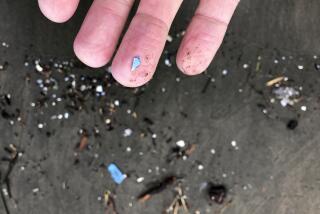Estrogen Imitator in Womb May Lead to Cancer in Men, Study Finds
- Share via
Male babies exposed in the womb to chemicals that mimic estrogen -- compounds found in birth control pills and some plastics -- are at risk of being born with deformities in their prostate and urethra that may lead to diseases in adulthood, a new study of lab animals has shown.
Some researchers say the wider use of the chemicals may have contributed to a surge in prostate cancer in the last two decades, particularly in men under 65.
Prostate cancer is the most common cancer in the United States other than skin cancer. The reported rate in men under 65 quadrupled from the mid-1980s to mid-1990s. Much of that increase is attributed to a new cancer-screening test, according to the National Cancer Institute. But some experts believe that the shift began before the new test, and may be due partly to environmental factors.
In the new study, biologists from the University of South Dakota School of Medicine and the University of Missouri at Columbia said they fed pregnant mice doses of two chemicals. One was ethinylestradiol, the drug found in birth control pills; the other was bisphenol A, found in polycarbonate -- a hard, clear plastic used in beverage containers and tin can linings. Both chemicals are estrogenic -- they imitate the natural female hormone estrogen -- and were given in doses considerably smaller than those some pregnant women were exposed to.
When given either compound, the male offspring of the mice were found, on average, to have microscopic defects in the prostate, that could lead to disease. With both chemicals, researchers also found the mice had a narrowing of the urethra, the channel that carries urine, which could lead to bladder disorders. Previous animal studies linked estrogenic chemicals to enlarged prostates.
Medical experts estimate that nearly 2 million women each year in the United States and Europe who take birth control pills become pregnant, primarily because of missed doses. They often do not know they are pregnant for several weeks and pass the chemicals to their fetuses by continuing to take the pills. The dose in oral contraceptives is typically four to five times higher than the dose that harmed the mice in the experiment, according to the study, published in this week’s online edition of the Proceedings of the National Academy of Sciences.
“Small amounts of estrogenic chemicals could permanently disrupt cellular control systems and predispose the prostate to disease in adulthood,” said the study authors, led by Barry G. Timms, a professor of biomedical sciences at the University of South Dakota who specializes in prostate biology.
Patricia Hunt, a professor at the School of Molecular Biosciences at Washington State University who was not involved in the study, said Monday that the new findings added to growing evidence that exposure before birth to bisphenol A and other estrogen mimics might cause cancers in reproductive tissues and organs.
“What’s remarkable here is that they are seeing it at such low doses,” she said. “It has the potential to explain why we have this increase in incidences of both cancers -- breast and prostate.”
Hunt’s earlier research found that exposing lab animals to low levels of bisphenol A could lead to a condition that is the leading cause of miscarriages.
Since birth control pills and bisphenol A have been in use for only a few decades, prenatal exposure cannot explain cancers in men over 65 -- the most common age for prostate cancer -- but it may play a role in the increased disease rate among younger men. Also, exposure during childhood and adolescence could trigger disease, Hunt said.
Bisphenol A is one of the most heavily used chemicals in the world today, with more than 6 billion pounds used annually. The chemical is essential to the making of polycarbonate plastic, but it can leach from the containers, which include baby bottles and water bottles. It also is used in some dental sealants.
About 90 published studies conducted on animals in the last two years had found adverse effects from low doses of bisphenol A.
But plastics industry representatives say that other studies they funded have found no effects and that polycarbonate products have a long and safe history dating back more than 50 years.
A bill by California Assemblywoman Wilma Chan (D-Alameda) would prohibit the sale or manufacture of children’s toys and feeding products that contain bisphenol A and other estrogen-mimicking compounds in plastic called phthalates. The bill passed an Assembly environmental committee last week.






